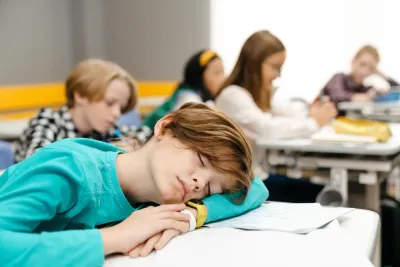
Key Takeaways
Healthy sleep habits are critical for kids and teens, supporting brain development, learning, and daily well-being.
- Quality sleep supports brain growth, learning, and memory, making rest as important as schoolwork.
- Children and teens need more sleep than adults—often 9 to 12 hours depending on age—yet many fall short.
- Evening screen time can delay melatonin release and disrupt sleep, making digital curfews an effective safeguard.
- Consistent bedtimes and wake times, including weekends, help regulate developing circadian rhythms.
- Parents play a key role by modeling healthy sleep habits and creating cool, dark, screen-free bedrooms.
What do young people need to be happy, healthy, and reach their fullest potential?
Love? Of course.
Support? Yep, and plenty of it!
Encouragement? You bet. Good role models? Yes, yes, and yes again.
Each of these elements is fundamental to any child’s success. But something else comes into play too: Sleep.
That’s right, although it may not be the first thing that springs to mind here, the more you learn about the topic, the more you realize that getting the right amount of high-quality sleep as a child is crucial to life’s short and long-term trajectory.
Today, I want to dive into the literature on children's sleep & teen sleep to explain why that’s the case. Without further ado, here are the main benefits of good sleep as it pertains to young people.
Kids Are Running on Empty: What the Latest Sleep Study Reveals
A recent Newsweek report highlighted a worrying trend—only 14% of American children are getting enough sleep. That means most kids are showing up to school already tired, which can seriously impact their focus, mood, and overall development. [1]
Sleep isn’t just downtime for kids—it’s when their brains process learning, their bodies grow, and their emotions reset. Without enough of it, everything from academic performance to emotional regulation takes a hit.
The study reinforces what parents already know deep down: bedtime matters. Consistent routines, cooler room temperatures, and less screen time before bed can make a big difference in helping kids fall asleep faster and stay asleep longer.
If your child struggles to get quality rest, think of sleep not as optional—but as essential fuel for growing minds and bodies.
Sleep Is Fuel
What do most babies and teenagers have in common?
They sleep…a lot.
A 2015 study in the Journal of Clinical Sleep Medicine begins with a list of consensus recommendations for sleep in pediatric populations. [2]
In it, they write that for optimal health, infants aged “4 months to 12 months should sleep 12 to 16 hours per 24 hours (including naps)” and that teenagers “13 to 18 years of age should sleep 8 to 10 hours per 24 hours on a regular basis”.
Why so long?
Because that’s what their brains and bodies need to fuel the many changes happening inside them. Just as sleeping after a workout helps your muscles recover, sleeping lots during childhood supports our physical and neurological development.
For proof, look no further than a recent study in Nature that investigated (among other things) the impact of sleep duration on brain volume in a whopping 11,067 9 to 11-year-old children. [3]
The authors found that “the brain areas in which higher volume was correlated with longer sleep duration included the orbitofrontal cortex, prefrontal, and temporal cortex, precuneus, and supramarginal gyrus.”
Crazy, right?
Correlation doesn’t imply causation. But this remains a compelling piece of research demonstrating the link between a child’s sleep and development.
Read More: Tips on How to Create a Better Bedtime Routine
Sleep Dictates Outcomes
Most people know (anecdotally, at least) how damaging sleep deprivation is in adulthood. Unfortunately, fewer people realize that it seems downright disastrous to a young person’s short- and long-term outcomes.
Here are a few areas where sleep seems particularly valuable:
Childhood Mental Health
I’ll draw your attention back to the aforementioned study in Nature here.
The authors write, “Dimensional psychopathology (including depression, anxiety, impulsive behavior) in the children was negatively correlated with sleep duration.” In other words, the less sleep they got, the more psychopathology they displayed.
They say that “…psychiatric problems…were significantly associated with short sleep duration one year later”. So, poor sleep can create an environment for psychiatric issues, which can bubble over into ongoing sleep problems—a potentially vicious cycle.

Teen Academic Performance
A wealth of evidence points to the value of sleep on a teenager’s cognitive capabilities and academic achievement.
For example, a 2020 article in Current Opinion in Physiology notes how “shortened sleep opportunities can have a direct impact on an adolescent’s performance in the classroom.” [4]
The authors then cite a lab study in which 15 to 17-year-olds demonstrated “impaired performance and lapses in sustained attention” following sleep restriction. Interestingly, after a simulated weekend of recovery sleep, their attention spans didn’t improve even though “self-reported sleepiness returned to baseline.”
Risk-Taking
Teenagers have a reputation for being impulsive and engaging in risky behaviors, such as drunk driving, drug-taking, rule-breaking, etc.
Related Blog: Want to help your teen get better rest? Learn more about why sleep is so important during the teenage years.
And there’s a good neurological reason for this…
As an article in Psychology Today explains, “another area of the brain, the lateral prefrontal cortex (PFC), is responsible for mature self-regulation and develops gradually over the adolescence period.” And what happens when you lack the means for mature self-regulation? You take more risks! [5]
This propensity seems to be compounded by a lack of sleep.
For instance, research in Morbidity and Mortality Weekly Report found that students who slept for “7 hours on school nights were more likely to report several injury-related risk behaviors”, such as riding a bike without a helmet or texting while driving, compared to those who slept 9 hours. [6]
Remember These Insights on Children's Sleep & Teen Sleep
As you can tell, sleep isn’t just essential in adulthood! It’s fundamental for the health and well-being of our kids as well.
If anything, the evidence implies that sleep’s even more valuable as a child and teenager. I hope these insights on children's sleep & teen sleep have demonstrated why that’s the case and support an effort to improve the statistics for these groups.
Peer-Reviewed Research References
-
Gray, D.
Only 14% of American Kids May Be Getting Enough Sleep.
Newsweek, 2025.
Source Type: National Health & Science Journalism
Key Insight: National survey data suggest that the vast majority of U.S. children are not meeting recommended sleep guidelines, raising concerns about long-term cognitive, behavioral, and physical health outcomes.
View Resource
Source URL: https://www.newsweek.com/only-14-percent-american-kids-enough-sleep-study-10845383
-
Paruthi, S., et al.
Recommended Amount of Sleep for Pediatric Populations: A Consensus Statement of the American Academy of Sleep Medicine.
Journal of Clinical Sleep Medicine, 2016.
Study Type: Expert Consensus Statement
Key Finding: The American Academy of Sleep Medicine established age-specific sleep duration recommendations to support optimal physical, cognitive, and emotional development in children and adolescents.
View Study
Source URL: https://doi.org/10.5664/jcsm.5866
-
Cheng, W., et al.
Sleep Duration, Brain Structure, and Psychiatric and Cognitive Problems in Children.
Molecular Psychiatry, 2021.
Study Type: Neuroimaging & Population Study
Key Finding: Shorter sleep duration in children was associated with measurable differences in brain structure and increased risk of psychiatric symptoms and cognitive challenges.
View Study
Source URL: https://www.nature.com/articles/s41380-020-0663-2
-
Sharman, R., & Illingworth, G.
Adolescent Sleep and School Performance — The Problem of Sleepy Teenagers.
Current Opinion in Physiology, 2020.
Study Type: Narrative Review
Key Insight: Chronic sleep deprivation in adolescents negatively affects academic performance, attention, emotional regulation, and daytime alertness.
View Study
Source URL: https://doi.org/10.1016/j.cophys.2019.11.006
-
Psychology Today.
Why Are Teen Brains Designed for Risk-Taking?
Source Type: Psychology & Neuroscience Education Resource
Key Insight: Ongoing brain development during adolescence, particularly in executive control regions, contributes to risk-taking behaviors that can be exacerbated by insufficient sleep.
View Resource
Source URL: https://www.psychologytoday.com/gb/blog/the-wide-wide-world-psychology/201506/why-are-teen-brains-designed-risk-taking
-
Wheaton, A. G.
Sleep Duration and Injury-Related Risk Behaviors Among High School Students — United States, 2007–2013.
MMWR Morbidity and Mortality Weekly Report, 2016.
Study Type: National Epidemiological Analysis
Key Finding: Short sleep duration among adolescents was associated with higher rates of injury-related risk behaviors, including substance use and unsafe activities.
View Study
Source URL: https://doi.org/10.15585/mmwr.mm6513a1









